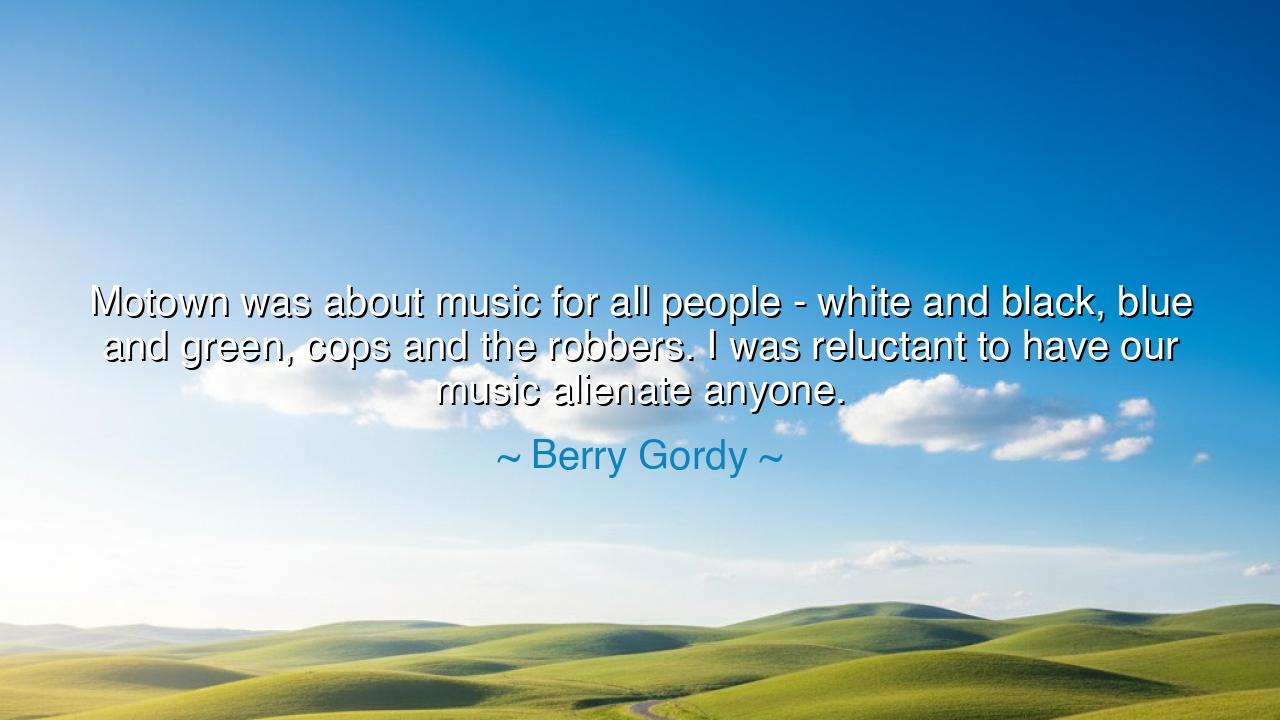
Motown was about music for all people - white and black, blue
Motown was about music for all people - white and black, blue and green, cops and the robbers. I was reluctant to have our music alienate anyone.






Berry Gordy, the architect of a cultural revolution, once declared: “Motown was about music for all people—white and black, blue and green, cops and the robbers. I was reluctant to have our music alienate anyone.” These words, though simple, carry the resonance of an ancient truth: art, when true, is not the property of one tribe, one color, or one people. It is a bridge across divisions, a fire that warms both friend and foe. Gordy, by founding Motown, gave voice to this truth, crafting not just a sound but a vision—a vision of unity through music.
In the days of Motown’s birth, America was torn by division. The walls of segregation still stood, and mistrust ran deep between communities. Yet in that climate of fracture, the music of Motown rose like a new dawn. Songs from The Supremes, The Temptations, Marvin Gaye, and Stevie Wonder carried rhythms that transcended barriers. They were not black songs or white songs, but human songs, speaking to joy, sorrow, longing, and love. Gordy’s words remind us of his purpose: to make music that drew all into its embrace, refusing to alienate, refusing to divide.
The ancients, too, believed in the unifying power of song. The Greeks told of Orpheus, whose lyre could tame beasts and soften the hardest of hearts. In Israel, King David played his harp to soothe the troubled spirit of Saul. Across every civilization, music was the one language that needed no translation. Gordy carried this timeless truth into the modern world. By insisting that Motown belong to everyone, he ensured that its legacy was not just a catalog of hits, but a force for healing in a divided land.
Consider the story of The Supremes performing on national television in the 1960s. At a time when many black performers were confined to segregated venues, their appearance reached millions of homes across racial lines. For countless viewers, it was the first time they saw black women not in the margins, but in the spotlight, radiant and elegant. Their voices carried Gordy’s vision: music not for one people alone, but for the human family. Each performance was a quiet revolution, eroding prejudice with the power of melody.
Yet Gordy’s reluctance to alienate anyone was not weakness—it was strength. In an age when bitterness might have been expected, he chose inclusivity. He understood that the power of music was not to sharpen divisions but to dissolve them. In making Motown for all, he multiplied its impact. Its songs climbed to the top of the charts, not as “black music” or “white music,” but as the sound of a generation. This was not compromise but triumph: the victory of connection over separation, harmony over discord.
What then is the lesson for us? That true art, true creation, must seek the common thread that binds humanity. In a world eager to divide by color, creed, or tribe, Gordy’s vision reminds us: do not alienate, but embrace. Music has power because it speaks to the universal—the heartbeat, the longing, the joy. If we would create, if we would lead, let us build not walls, but bridges.
Practical wisdom follows: when you work, when you create, ask yourself—does this exclude, or does this invite? Does it divide, or does it unite? Seek always to speak to the heart of humanity, not only to your own reflection. Just as Gordy shaped Motown into a vessel for all, so too can you shape your life’s work into something that transcends boundary. Let inclusivity be your strength, not your weakness.
So remember Berry Gordy’s words: “Motown was about music for all people.” Carry them as a teaching across the ages. For though nations rise and fall, though cultures shift and change, the need for unity remains eternal. Let your art, your voice, your deeds become like Motown—songs for the whole human race, timeless, unifying, unforgettable.






AAdministratorAdministrator
Welcome, honored guests. Please leave a comment, we will respond soon